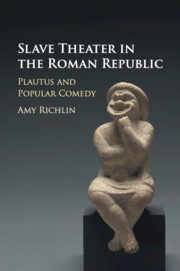Description
Slave Theater in the Roman Republic
Plautus and Popular Comedy
Author: Richlin Amy
Brings the voices of Roman slaves in early comedy to the history of theater and the history of slavery.
Language: EnglishApproximative price 40.64 €
In Print (Delivery period: 14 days).
Add to cart
Slave Theater in the Roman Republic
Publication date: 05-2019
Support: Print on demand
Publication date: 05-2019
Support: Print on demand
Approximative price 164.74 €
In Print (Delivery period: 14 days).
Add to cart
Slave Theater in the Roman Republic
Publication date: 12-2017
Support: Print on demand
Publication date: 12-2017
Support: Print on demand
Description
/li>Contents
/li>Biography
/li>
Roman comedy evolved early in the war-torn 200s BCE. Troupes of lower-class and slave actors traveled through a militarized landscape full of displaced persons and the newly enslaved; together, the actors made comedy to address mixed-class, hybrid, multilingual audiences. Surveying the whole of the Plautine corpus, where slaves are central figures, and the extant fragments of early comedy, this book is grounded in the history of slavery and integrates theories of resistant speech, humor, and performance. Part I shows how actors joked about what people feared - natal alienation, beatings, sexual abuse, hard labor, hunger, poverty - and how street-theater forms confronted debt, violence, and war loss. Part II catalogues the onstage expression of what people desired: revenge, honor, free will, legal personhood, family, marriage, sex, food, free speech; a way home, through memory; and manumission, or escape - all complicated by the actors' maleness. Comedy starts with anger.
1. History and theory; Part I. What Was Given: 2. The body at the bottom; 3. Singing for your supper; Part II. What Was Desired: 4. Getting even; 5. Looking like a slave-woman; 6. Telling without saying; 7. Remembering the way back; 8. Escape; Conclusions: from stage to rebellion.
Amy Richlin is Professor of Classics at the University of California, Los Angeles. She is a path-breaking historian of Roman sexuality. From the time of her first book, The Garden of Priapus: Sexuality and Aggression in Roman Humor (1983), she has searched for the subcultures of muted groups and outgroups outside the literary canon. Her many articles include 'Hijacking the Palladion', 'Not before Homosexuality', and 'Pliny's Brassiere'; in 'Boy-Love and Child-Love' (2015), rethinking Roman pederasty, she argued that the Greco-Roman slave system enabled child sex slavery. Her book Marcus Aurelius in Love (2006) translated the love letters of Cornelius Fronto and his student, the young future emperor. An outspoken feminist, she edited Pornography and Representation in Greece and Rome (1992) and co-edited Feminist Theory and the Classics (1993); her essays on Roman women's history are collected in Arguments with Silence (2014). Since 2000, she has been working on Roman comedy, and addressed the need to teach about ancient Orientalism in Rome and the Mysterious Orient: Three Plays by Plautus (2005).
© 2024 LAVOISIER S.A.S.
These books may interest you

A Companion to Plautus 206.11 €



